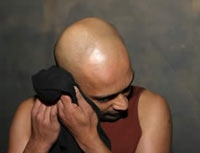 'What use is my wisdom against this chaos?' sings Brünnhilde in Phyllida Lloyd's production of 'Twilight of the Gods' at the Coliseum in London. After almost six hours of climactics, Wagner's Ring Cycle ends as Brünnhilde immolates herself together with the cursed ring of the nibelung which is to be purified by the same fire that will take her to her beloved Siegfried.
'What use is my wisdom against this chaos?' sings Brünnhilde in Phyllida Lloyd's production of 'Twilight of the Gods' at the Coliseum in London. After almost six hours of climactics, Wagner's Ring Cycle ends as Brünnhilde immolates herself together with the cursed ring of the nibelung which is to be purified by the same fire that will take her to her beloved Siegfried.
This was the first time I had seen more than 'the Valkyrie', the second in the cycle. That production in Budapest stunned me, every emotional nuance of the characters seemingly mirrored by the wonderful expressiveness of the orchestral writing.
The ENO production has been more controversial. I sent my sister to the much shorter 'Rheingold' - number one in the cycle - as her introduction to live opera. She and her husband loved the music and the light-hearted staging.
Traditionalists found plenty to gripe at: Wotan seem to have been partly inspired by Ozzy Osbourne and we saw him in the bath. A soap opera in every sense. On balance, I enjoyed the 'home life of the immortals' staging. The non too subtle story was that the Gods have crises just like characters in 'Eastenders'.
Even so, a measure or two tragic grandeur in the final part of the Ring seemed essential, even for the most contemporary of productions. Act one, the longest at over two hours, began with the lady norns getting their knitting of time in a twist. The Rhinemaidens pole danced again and the valkyrie were encouragingly punky (as seen at last year's Glastonbury Festival). But the singing lacked oomph, wicked Hagen was off-key and Siegried was underwhelming.
It got much better in the second and third acts. Siegfried's death and funeral march and Brünnhilde's burning were terrifically involving. The Rhine rose to cover her ashes and Valhalla fell with three vast shimmering golden curtains and a fade to black.
Powerful stuff and far too complex for me to fully comprehend after just one performance. The sensual, amoral music thrilled me but the performance lacked the devestating impact I hoped for. Am I becoming jaded or can the English not do Wagner?
-
-
Akram Khan in 'Third Catalogue', Purcell Room, 14.4.05
 The final part of kathak dancer Khan's trilogy of solos on the South Bank. Central solos from the first two parts of his trilogy, Polariod Feet and Ronin plus a new solo. Khan on stage with five musicians, including singer Faheem Mazhar and BC Manjunath, the percussionist from his company's current touring show, 'ma'.
The final part of kathak dancer Khan's trilogy of solos on the South Bank. Central solos from the first two parts of his trilogy, Polariod Feet and Ronin plus a new solo. Khan on stage with five musicians, including singer Faheem Mazhar and BC Manjunath, the percussionist from his company's current touring show, 'ma'.
A performer whose work has consistently mesmerised me, not just because of his compelling stage presence, but also because of his very evident deep commitment to his art. In an interview in 'The Times', Khan describes his work as 'an offering', meaning that it is to be read as an expression of his spirituality. That intense feeling moved me, but there was also wit and wonderful precision. Khan held the stage with beauty and astonishing control. He has the ability to switch seamlesly from the most rapid and energetic movement to one of langorous delicacy, and this was especially visible in his first solo, which depicted the duality of the male and female principles in Hindu Gods.
In the second half Khan came to the microphone to gently teach the audience about kathak. Compelling improvisations followed, with the joyful collaboration of his musicians.
His next contemporary performance will be 'Zero Degrees', a collaboration with Anthony Gormley at Sadler's Wells next July. In 2006 he will dance with Sylvie Guillem.
Times article